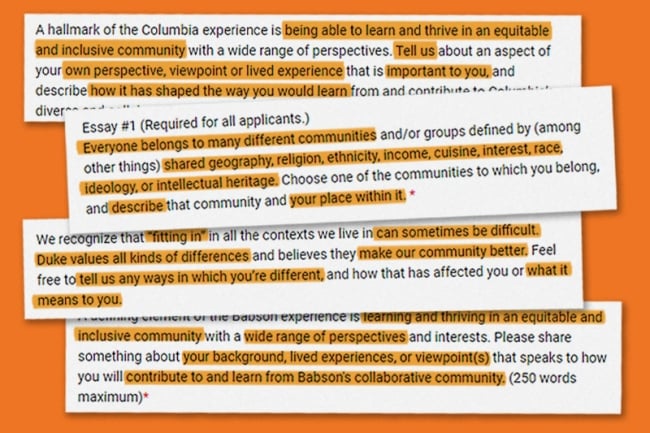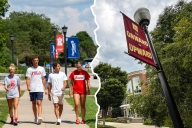You have /5 articles left.
Sign up for a free account or log in.

Photo illustration by Justin Morrison/Inside Higher Ed
Even in a typical year, Aug. 1 is a big day for college admissions.
It’s launch day for the Common App, the 1,000-member platform for college applications, and the beginning of many months of preparation and nervous anticipation for parents and applicants of all ages. Many college counselors refer to it as “admissions new year.”
But yesterday wasn’t just the start of a new year in admissions; it was the dawn of a new era, the first application cycle since the Supreme Court struck down affirmative action.
Already many colleges are changing their applications to reflect the shift. Over two dozen institutions appear to have introduced new essay prompts this year, many of which are clearly linked to the Supreme Court decision. Other institutions are changing their admissions policies; Virginia Tech, for one, announced Monday that it would eliminate both its early-decision option and legacy admissions preferences.
Jill Orcutt, global lead for consulting at the American Association of Collegiate Registrars and Admissions Officers (AACRAO), said she’s “not at all surprised” that institutions are entering this application cycle with new policies and prompts. As she’s consulted with admissions deans and college leaders over the past month, her most common piece of advice—in lieu of specific guidance from the Department of Education—is for institutions to carefully review and revise their applications to ensure both legal compliance and a steadfast commitment to institutional values.
“We’ve asked them, ‘Do your admissions policies and procedures align with your university’s vision and mission?’” she said. “And we’ve encouraged them to rethink any essay questions that might be considered inappropriate or not in alignment, while also seeking out those with lived experience or characteristics that match what your institution is looking for.”
A Flood of New Prompts
Admissions essays have been the subject of hopeful discussion about how institutions can ensure the racial diversity of their incoming classes without affirmative action since Chief Justice John Roberts wrote in the decision that “nothing in this opinion should be construed as prohibiting universities from considering an applicant’s discussion of how race affected his or her life, be it through discrimination, inspiration, or otherwise.”
A majority of colleges don’t use supplemental essay questions and are likely to rely on the Common App’s long-standing essay prompt inviting all applicants to share a “background, identity, interest or talent” that is meaningful to them. Many others, including Vassar College and Yale University, have yet to finalize their prompts and plan to post them later this month.
But a large number of institutions—many of them private, selective colleges—have already revised or added supplemental questions in response to the Supreme Court ruling. They range from direct references to the Supreme Court decision to broader questions about an applicant’s “cultural background” and “lived experiences.” Some ask about applicants’ intellectual views on the “values” of diversity and inclusion.
Babson College, a small business-focused undergraduate institution in Wellesley, Mass., rolled out a new supplemental essay question that reads, “A defining element of the Babson experience is learning and thriving in an equitable and inclusive community with a wide range of perspectives and interests. Please share something about your background, lived experiences, or viewpoint(s) that speaks to how you will contribute to and learn from Babson’s collaborative community.”
Kathryn Balcerski, Babson’s senior external communications manager, told Inside Higher Ed via email that the new prompt is “related to the Supreme Court decision” on affirmative action.
“In moving to a competency-based application review process in our individualized holistic review of applicants, we seek to identify qualities in applicants that serve the institutional mission at Babson College,” she wrote.
The University of Massachusetts at Amherst introduced a new supplemental essay that begins, “At UMass Amherst, no two students are alike.”
The prompt goes on to discuss the ways “our communities and groups often define us and shape our individual worlds,” noting that “community” covers a wide range of characteristics—including “race/ethnicity.” Then it asks students to “Please choose one of your communities or groups and describe its significance. Explain how, as a product of this community or group, you would enrich our campus.”
Ed Blaguszewski, UMass’s executive director of media relations, told Inside Higher Ed via email that the prompt was added as a direct result of the Supreme Court ruling.
“This is a new essay prompt for students and it’s there to give applicants an additional opportunity to help us understand their background and experiences,” he wrote. “While the court stated that even though race/ethnicity itself cannot be considered, the impact it has had on the applicant can be considered.”
Sarah Lawrence College responded to the Supreme Court decision even more boldly in its new essay prompt; it quotes directly from Roberts’s decision and asks applicants to reflect on how it will affect their college experience.
A cursory navigation of the Common App appeared to show dozens of colleges with new supplemental essay questions formulated either to better comply with the Supreme Court’s affirmative action ban or to elicit responses about applicants’ racial identity in order to circumvent it. A few more examples, confirmed to be new by university spokespeople, follow:
- Brandeis University: “Brandeis was established 75 years ago to address antisemitism, racism, and gender discrimination in higher education, and today, the university remains dedicated to its founding values of inclusivity and justice. How has your educational experience shaped your perspective on these values?”
- Columbia University: “A hallmark of the Columbia experience is being able to learn and thrive in an equitable and inclusive community with a wide range of perspectives. Tell us about an aspect of your own perspective, viewpoint or lived experience that is important to you, and describe how it has shaped the way you would learn from and contribute to Columbia’s diverse and collaborative community.”
- Emory University: “Reflect on a personal experience where you intentionally expanded your cultural awareness,” or “Emory University has a strong commitment to building community. Tell us about a community that you have been part of where your participation helped to change or shape the community for the better.”
Orcutt, from AACRAO, said the emphasis on essay responses is going to be greater than ever this admissions cycle.
“As we talk with high school counselors, community college counselors and university and college admissions officers, we’ve heard them all say they’re going to embrace the opportunity they have to present and evaluate their applicants using those essays,” she said. “It’s definitely a new approach, new advice given to students and their families about how to complete an application.”
Amending Policies and Requirements
Lafayette College didn’t add any supplemental prompts this year. But the liberal arts college in Easton, Pa., did take a unique step that its leaders feel will bolster efforts to recruit and admit a more diverse student body: it reduced the number of extracurriculars admissions counselors will consider from an applicant.
The Common App has 10 slots for applicants to list their extracurricular activities, but Lafayette president Nicole Hurd said the college will stop reading after six; for those who apply via early decision, only six slots will be available.
Hurd said the expectation that high school students amass a long list of extracurriculars in addition to their schoolwork is onerous, especially for low-income or first-generation students who already have extracurricular responsibilities like caring for a sick family member or younger sibling, or working one or more jobs.
“I’m not even sure students know that teaching an elderly family member English or going to babysit a cousin is actually an activity that’s meaningful,” she said. “We’re looking for curiosity and resilience and inquisitiveness and commitment, and all those things show up in things that they might not consider an ‘activity.’”
Hurd, who founded and led the College Advising Corps before coming to Lafayette in 2021, said the extracurricular adjustment was “already in the works” before the Supreme Court ruling, but the decision only made it more essential. She hopes to gather feedback from applicants and high school counselors this year and then “set the tone for other colleges.”
Lafayette is taking the step in partnership with Common App, Hurd said, as a kind of pilot program to test the waters of changing expectations for applicants. Jenny Rickard, Common App president and CEO, supports the move wholeheartedly.
“Common App data show that there are stark and substantial differences in the total number of activities applicants report across nearly every measure of race and income-level,” she wrote in an email to Inside Higher Ed. “While the Activities section of the Common App is a great place for students to show colleges how they contribute to their families, school, and community, the focus should always be on the substance of the activities rather than the number.”









